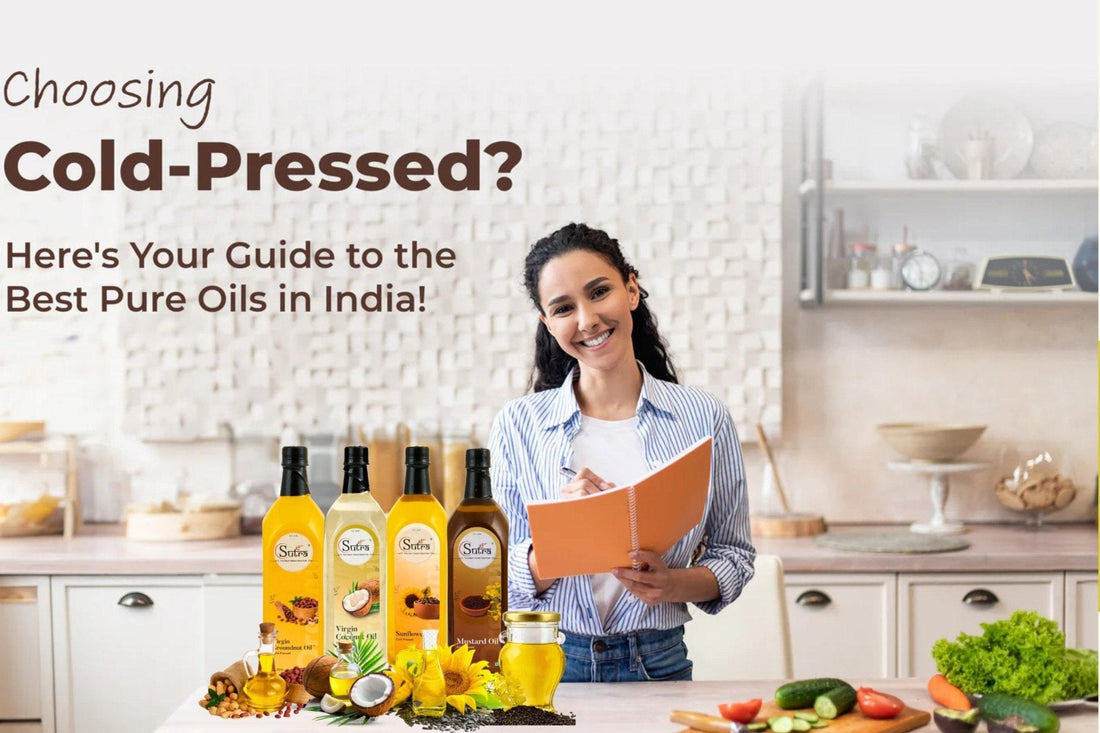What is Cold Pressed Oil? Benefits, Uses & How It’s Made

What is Cold Pressed Oil? Benefits, Uses & How It’s Made
Cold pressed oil is a pure, chemical-free oil extracted from seeds or nuts without using heat or harmful solvents. This traditional extraction method preserves the oil’s natural nutrients, aroma, and flavor — making it healthier for cooking and skincare compared to refined oils.
What is Cold Pressed Oil?
Cold pressed oil is obtained by mechanically pressing seeds, nuts, or fruits at a low temperature, usually below 50°C. The absence of heat ensures that vital compounds like vitamins, antioxidants, and essential fatty acids remain intact.
In India, this process is also known as wood pressed oil or Ghani pressed oil, where a wooden churner slowly crushes the seeds to extract pure oil.
How is Cold Pressed Oil Made?
- Selection of Raw Material: High-quality, clean seeds or nuts (like groundnut, coconut, sesame, or sunflower) are chosen.
- Cleaning: Impurities like stones, dust, and husk are removed.
- Pressing: A wooden or steel press gently crushes the seeds without generating high heat.
- Filtration: The extracted oil is naturally filtered to remove seed particles without using chemicals.
- Packing: The oil is stored in glass or food-grade containers to maintain freshness.
Benefits of Cold Pressed Oil
1. Nutrient-Rich
Cold pressed oils retain natural vitamins like Vitamin E, essential fatty acids, and antioxidants which are often destroyed in refined oils.
2. Better for Heart Health
These oils are high in unsaturated fats, which help lower bad cholesterol and support cardiovascular health.
3. Chemical-Free
No bleaching agents, preservatives, or artificial additives are used in the extraction process.
4. Natural Aroma & Taste
Cold pressed oils have a rich, authentic flavor that enhances food taste.
5. Versatile Uses
They are suitable for cooking, skincare, hair care, and even traditional Ayurvedic therapies.
Uses of Cold Pressed Oil
- Cooking: Ideal for sautéing, salad dressings, and low-heat cooking.
- Skincare: Moisturizes skin naturally and helps prevent dryness.
- Hair Care: Nourishes scalp and strengthens hair roots.
- Ayurvedic Therapies: Used in massages and detox treatments.
- Baby Care: Gentle on sensitive baby skin when used as massage oil.
Cold Pressed Oil vs Refined Oil
| Aspect | Cold Pressed Oil | Refined Oil |
|---|---|---|
| Extraction | No heat or chemicals | High heat and chemical solvents |
| Nutrient Retention | High | Low |
| Taste & Aroma | Natural & rich | Neutral or bland |
| Shelf Life | Shorter (natural) | Longer (due to preservatives) |
Best Cold Pressed Oils for Daily Use
- Groundnut Oil: Great for frying and Indian cooking.
- Coconut Oil: Excellent for skin, hair, and medium-heat cooking.
- Sesame Oil: Ideal for massages and South Indian dishes.
- Sunflower Oil: Light, mild flavor for everyday cooking.
- Mustard Oil: Strong flavor, perfect for pickles and North Indian recipes.
Tips to Identify Pure Cold Pressed Oil
- Rich natural aroma — should smell like the seed/nut it’s made from.
- Cloudy or slightly thick consistency — not crystal clear like refined oils.
- No strong artificial color or fragrance.
- Buy from trusted brands or local oil mills.
Conclusion
Cold pressed oil is more than just a cooking ingredient — it’s a natural, nutrient-rich choice for a healthier lifestyle. By switching from refined oils to pure cold pressed oils, you can enjoy better taste, improved nutrition, and multiple health benefits.
FAQs about Cold Pressed Oil
1. Is cold pressed oil better than refined oil?
Yes, cold pressed oils retain nutrients and antioxidants that are destroyed in refined oils.
2. Can I use cold pressed oil for frying?
It’s best for sautéing or medium-heat cooking. For deep frying, use oils with a higher smoke point like groundnut oil.
3. How should I store cold pressed oil?
Keep in a cool, dark place away from direct sunlight. Use airtight containers.


